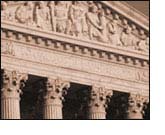| |

CT Divorce Law Questions & Answers
The following is a brief, non-exhaustive checklist for you to complete to consider in determining whether it may be appropriate to file for divorce:
A. Are you ready? (Have you tried working it out, either on your own or with the help of a therapist or marriage counselor?)
- Yes ____ No _____
B. Are you the victim of domestic violence, which is unlikely to stop?
Yes ____ No _____
C. Do you feel that your children will be better off if you are divorced, rather than living under the present
marital circumstances?
- Yes ____ No _____
D. Have you considered the financial effects of a divorce? - Yes
____ No _____
E. Have you considered the effect on other family members, such as the grandparents of your children?
- Yes ____ No _____
F. Is the timing appropriate? (ie, Is it the holiday season? Does your child have one year left in high school?)
- Yes ____ No _____
G. Are you prepared to accept that things may, believe it or not, get even worse before they get better?
- Yes ____ No _____
H. Are you willing to temporarily give up some control over your life, and place it into the hands of the court system?
- Yes ____ No _____
I. If your spouse is also thinking along the same lines, have you tried to narrow down the issues that you disagree on? This can make your divorce proceed much more smoothly and quickly
- Yes ____ No _____
J. Does your spouse engage in self-destructive behavior, which is unlikely to stop?
- Yes ____ No _____
K. Do you feel that you no longer have any common interests which you share with your spouse?
- Yes ____ No _____
L. Do you have no choice? (Has your spouse already filed a divorce action against you?)
- Yes ____ No _____
RETURN
TO TOP
Child Custody
What does joint custody mean? It means that both parents are responsible for making the major decisions affecting their children’s lives, such as their education or religious upbringing.
What is physical custody? As it implies, where the child physically resides. It can be shared when there is a joint custody award.
 What is sole custody? With sole custody, the child will primarily reside with one parent, who has final decision making responsibility (the custodial parent).
What is sole custody? With sole custody, the child will primarily reside with one parent, who has final decision making responsibility (the custodial parent).
What is meant by reasonable visitation? The parties agree among themselves as to spending time with their children on a flexible basis.
How about a fixed visitation schedule? This is a specific, set schedule of time for a child to spend with each parent.
Supervised visitation? This requires that another adult be present whenever the child visits the
non-custodial parent.
What is a no contact order? This is an order of the court that the
non-custodial parent may not see the child at all, because it is not in the child’s best interest.
Child Support
What is it? Exactly what it says, - your obligation to pay for the maintenance of your children,
Are there guidelines that apply? Yes. Connecticut has child support guidelines to determine the amount of child support to be paid by the
non-custodial parent.
Can these guidelines be varied? If the judge or family support magistrate feels that it is appropriate, based upon reasons specified in the guidelines, they may be.
How do child support orders get paid? Through an income withholding order, unless a waiver is signed by both parties.
Are these specific court personnel whom I may have to deal with in regard to child support issues? Yes, family relations counselors and support enforcement officers.
What about health insurance coverage for my child? You can expect the court to issue an order to require that the child be provided with health coverage.
How long do I have to support a child? Generally, until the child completes the twelfth grade or attains the age of nineteen, whichever first occurs.
RETURN
TO TOP
Post Judgment
After what seems like an interminable journey through the court system, you finally receive your divorce judgment. At long last, it ‘s over, right? Yes and no. Unfortunately, the area of post judgment issues can become nearly as time – consuming as the initial divorce process.
 A judgment of the court may only be opened or set aside within four months after the date the judgment enters, barring a lack of jurisdiction or fraud. Sec 52-212a, Conn. General Statutes.
A judgment of the court may only be opened or set aside within four months after the date the judgment enters, barring a lack of jurisdiction or fraud. Sec 52-212a, Conn. General Statutes.
Appeals are a possibility from a judgment, within twenty days of the notice of judgment, although only a small percentage of cases are appealed.
Post judgment motions, like the original writ, will be served by a sheriff, unless your attorney’s appearance is still on file in your case. In divorce cases, an
attorney's appearance is automatically considered withdrawn by the court six months after the judgment is entered.
What is the legal standard for granting a modification? A substantial change in the circumstance of either party which is not self-created. However, if the divorce decree specifically states that an alimony award is
non-modifiable, it will not be subject to post judgment modification.
Custody and visitation may be subject to modification if it is in the best interest of the children. If contested, you can expect the modification to be referred to a family relations officer (FRO) for a study.
Don’t expect retroactive support and alimony orders on a modification. Do expect a motion for modification and a motion for contempt to be heard at the same time. The statute specifically provides for this. (Sec 46 b-8 of the General Statutes)
There are small fees payable to the court for post judgment modification and contempt motions.
The court has the power to enforce its orders via contempt orders. A motion for contempt can be brought against the violating party, who may be personally served via citation. If the
person fails to appear in court in response to the citation, a judge may issue a capias to have the person physically brought to court.
What can happen to a person found in contempt? The court has a wide variety of options: a wage execution, a continuance, incarceration, and/or reprimand, as well as an order to pay sheriff and attorney
fees incurred by the non-violating party.
RETURN
TO TOP
© 2000 Website Developed by NRG
Networks, Inc
|
